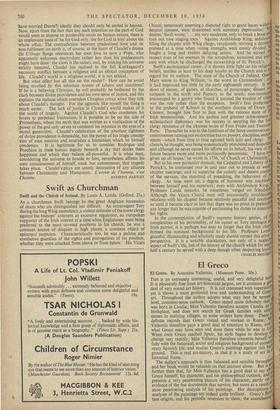Swift as Churchman
Swift and the Church of Ireland. By Louis A. Landa. (Oxford. 21s.) As a churchman Swift belongs to the great Anglican succession of deans who are distinguished but difficult. An intransigent Tory during the long Whig ascendency,a violent defender of the lower clergy against the bishops' attempts at excessive regulation, an outspoken supporter of the Irish interest at a time when Englishmen were being preferred to the most coveted positions in his church, he was a .constant source of disquiet in high places, a constant object of episcopal suspicion. Characteristically too, he was a jealous and combative guardian of the rights and prerogatives of his position, whether they were attacked from above or from below. His Vicars
Choral, temerously asserting a disputed right to grant leases withoill decanal consent, were threatened with summary deprivation: desires,' Swift wrote,' ... are very moderate, only to break a lease all turn out nine singing men.' Against Archbishop King, sedulous! filling the chapter with Whig clergy, vexatiously reviving a dorm prebend at a time when voting strengths were evenly divided. Ig fought a long and tireless delaying action. And he earned respect even of his enemies by the scrupulous, sustained and Om' care with which he discharged the stewardship of St. Patrick's. , Swift's ecclesiastical career, if it throws little light on his religioLl beliefs, testifies at least to his deep loyalty to the Church and to lo regard for its welfare. The state of the Church of Ireland, Qti Mary wrote to King William, is the worst in Christendom'; it had improved but little by the early eighteenth century. It short of money, of glebes, of churches, of parsonages; dissent rampant in the, north and Papistry in the south; non-residence encouraged by a gentry who found it assisted the evasion of tithel' was the rule rather than the exception. Swift's first prefermeilt to the prebend of Kilroot in the northern diocese of Down Connor, brought him face to face with the ruinous state of 0 Irish temporalities. And his earliest and greatest achievement.0,1 ecclesiastical diplomacy was his success in securing for the If clergy remission of the irksome levies of First Fruits and Twenlicl" Parts. Thereafter he was in the forefront of the fierce controversies' controversies turning not on doctrine but on powers, discipline, endou'' ments—which from time to time agitated both laity and clergy. Tv; church e he thought, was being systematically plundered and despoilo and although he never ceased his efforts on its behalf, his. view of t,ht future became more and more profoundly pessimistic. 'I have given up all hopes,' he wrote in 1736, 'of Church or Christianity. But in his own particular domain, the Cathedral and Liberty of SI Patrick's, he continued year in and year out to preside at wco:i chapter meetings; and to supervise the orderly and decent condo', of the services, the standard of preaching, the behaviour of 111e clergy. As time went on, a degree of harmony was establish between himself and his superiors; even with Archbishop King., Professor Lancia remarks, he sometimes 'verged on friendshiP. Although the Vicars Choral were still occaSionally troublesoint relations with his chapter became relatively peaceful and continuo so until it became clear at last that there was no point in pretend any longer that he was capable of performing his duties or exercisin his rights. In the contemplation of Swift's supreme literary genius, of ti complexities of his personality, of his career as Tory apologist e0; Irish patriot, it is perhaps too easy to forget that the Irish cliU formed the constant background to his life. Professor Land graceful, illuminating and scholarly study should correct this error perspective. It is a notable elucidation, not only of a neglocti, aspect of Swift's life, but of the history of the church which for nen!, half a century he served with a deep though often despairing 10Yillt";
CHARLES MONTEll








































 Previous page
Previous page